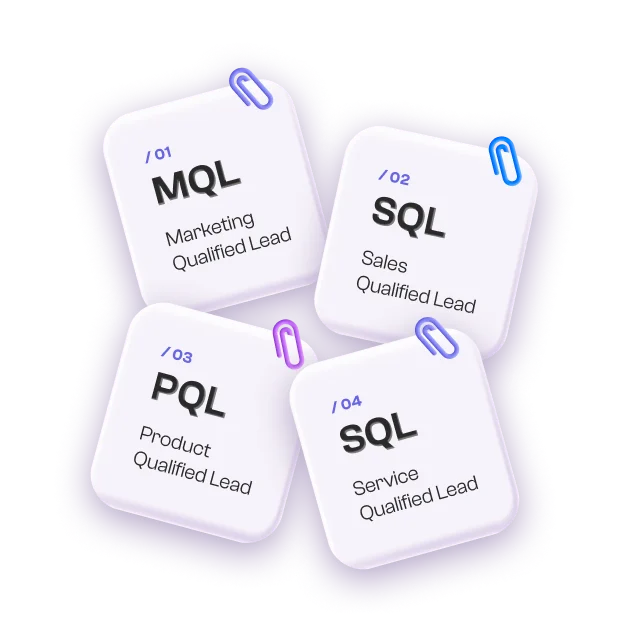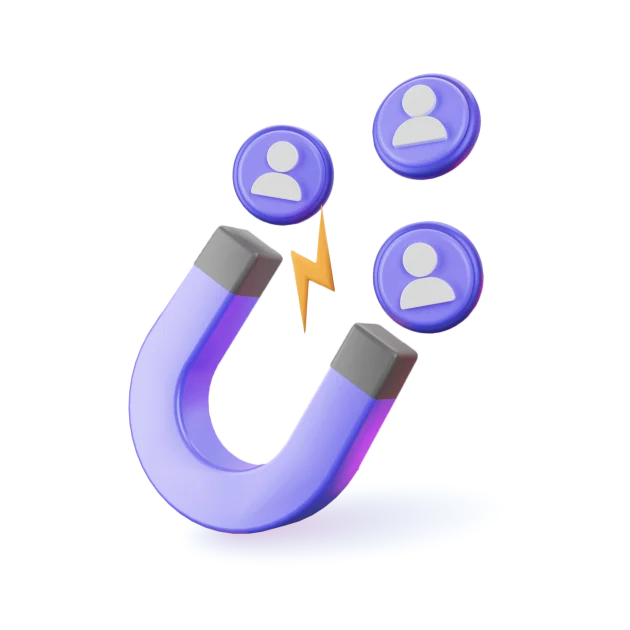Let’s answer a foundational question: What is an ICP?
Before we dive in, let’s clarify the definition of ICP: it’s a detailed profile of the company most likely to benefit from and buy your product or service.
Think of your ICP as a crystal-clear snapshot of the customer who gets the most value from what you offer and brings the most value back to your business. From a strategic point of view, the ICP business definition focuses on identifying the companies that bring both profitability and strategic alignment.
We’re not just talking demographics here. A strong ICP includes firmographics, behavior patterns, goals, pain points, and buying triggers. It’s about figuring out who’s the best match for your solution and making sure your efforts are laser-focused on reaching them.
- Why Do You Need an Ideal Customer Profile?
- Top Benefits of an Ideal Customer Profile (ICP)
- Buyer Persona vs ICP — What’s the Difference?
- How to Create an Ideal Customer Profile: Detailed Guide
- Why Is an Ideal Customer Profile Important?
- How Your ICP Marketing Strategy Shapes the Entire Funnel
- Your Sales Process and ICP
- Who Is Your Ideal Customer?
- ICP Template to Get You Started
- What Does ICP Mean Across Different Industries?
- Questions to Help You Define Your Ideal Customer
- Ideal Customer Profile Example Breakdown by Industry
- Conclusion
- FAQ
Why Do You Need an Ideal Customer Profile?
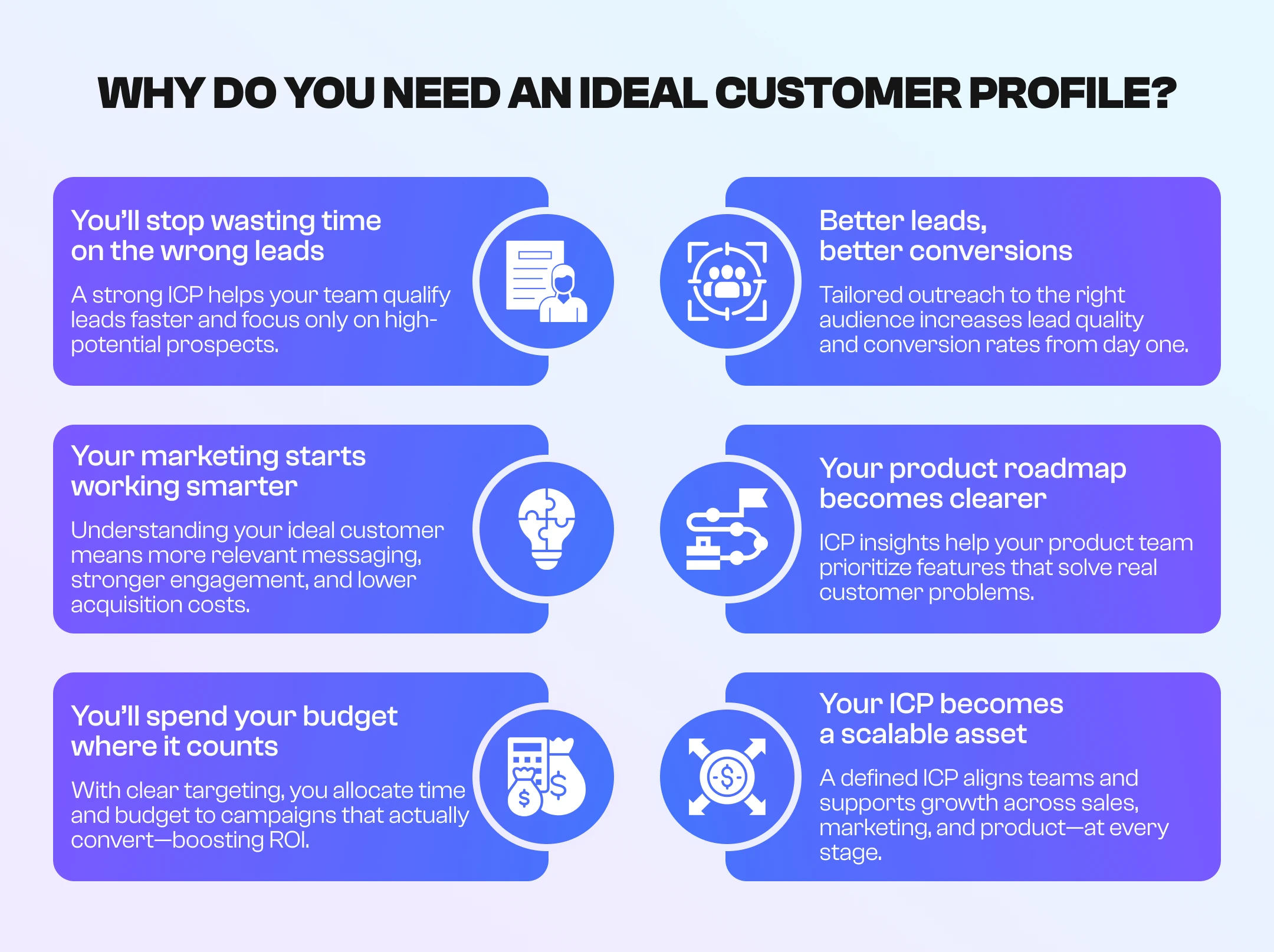
1. You’ll stop wasting time on the wrong leads
Ever spend hours chasing a lead only to realize it would never convert? Happens all the time. With a clear ICP, you can zero in on the people or companies worth your time. You’ll qualify leads faster, and your sales team can focus on deals that have real potential.
The more accurate your approach to defining ideal customer profile, the more effective your lead generation and qualification efforts will be.
2. Your marketing starts working smarter
The better you understand your ideal customer, the easier it is to speak their language. You’ll know what problems they’re trying to solve, what motivates their buying decisions, and where they hang out online. This means more relevant messaging, higher engagement, and lower acquisition costs. According to HubSpot, personalized CTAs convert 202% better than generic ones, and it all starts with a strong ICP.
3. You’ll spend your budget where it counts
No more spraying and praying. When you know precisely who you’re targeting, you can allocate your budget, time, and team toward campaigns that are likely to convert. That’s how you boost ROI and avoid burning cash on traffic that would never turn into revenue.
4. Better leads, better conversions
Your lead quality improves when your outreach is tailored to the right audience. For example, if you sell software to small healthcare clinics, your messaging should address their challenges, not generic benefits. A well-defined ICP helps you build that content and outreach strategy from day one.
5. Your product roadmap becomes clearer
A deep understanding of your ideal customer doesn’t just help marketing and sales—it guides product development too. When you know what your customers struggle with, you can build features that solve real problems. That’s how you stay relevant and keep customers coming back.
6. Your ICP becomes a scalable asset
The beauty of a strong ICP isn’t just in what it does today—it’s how it sets you up for growth tomorrow. As your company expands, onboarding new team members, launching new campaigns, or entering new markets becomes easier when you have a clear reference point. A well-built B2B ideal customer profile template ensures consistency in how your team qualifies leads, creates messaging, and allocates resources. It becomes a living document that aligns everyone, from sales to marketing to product, on who you serve and why.
Top Benefits of an Ideal Customer Profile (ICP)
Before you dive into personas and targeting tactics, it’s crucial to understand why defining your ideal customer profile (ICP) is so powerful. A well-crafted ICP aligns your entire organization—sales, marketing, product, and customer success—around a shared understanding of who you’re here to serve.
Here are the top benefits:
- Focused Growth: By knowing exactly who you’re targeting, you can streamline marketing campaigns, cut acquisition costs, and eliminate guesswork in outreach.
- Stronger Messaging: By clarifying what your ideal customers care about, you can create tailored content that resonates deeply.
- Efficient Sales: Reps waste less time chasing the wrong leads. Instead, they focus on accounts with real potential—a core principle of any effective ICP sales strategy.
- Better Product-Market Fit: Understanding your ideal customer helps your product team build features that meet real needs, boosting satisfaction and retention.
- Scalability: Once your ICP is defined, it becomes easier to replicate success, grow pipeline quality, and scale in the right direction.
When your ICP is clear, every team knows where to aim—and how to win.
Buyer Persona vs ICP — What’s the Difference?
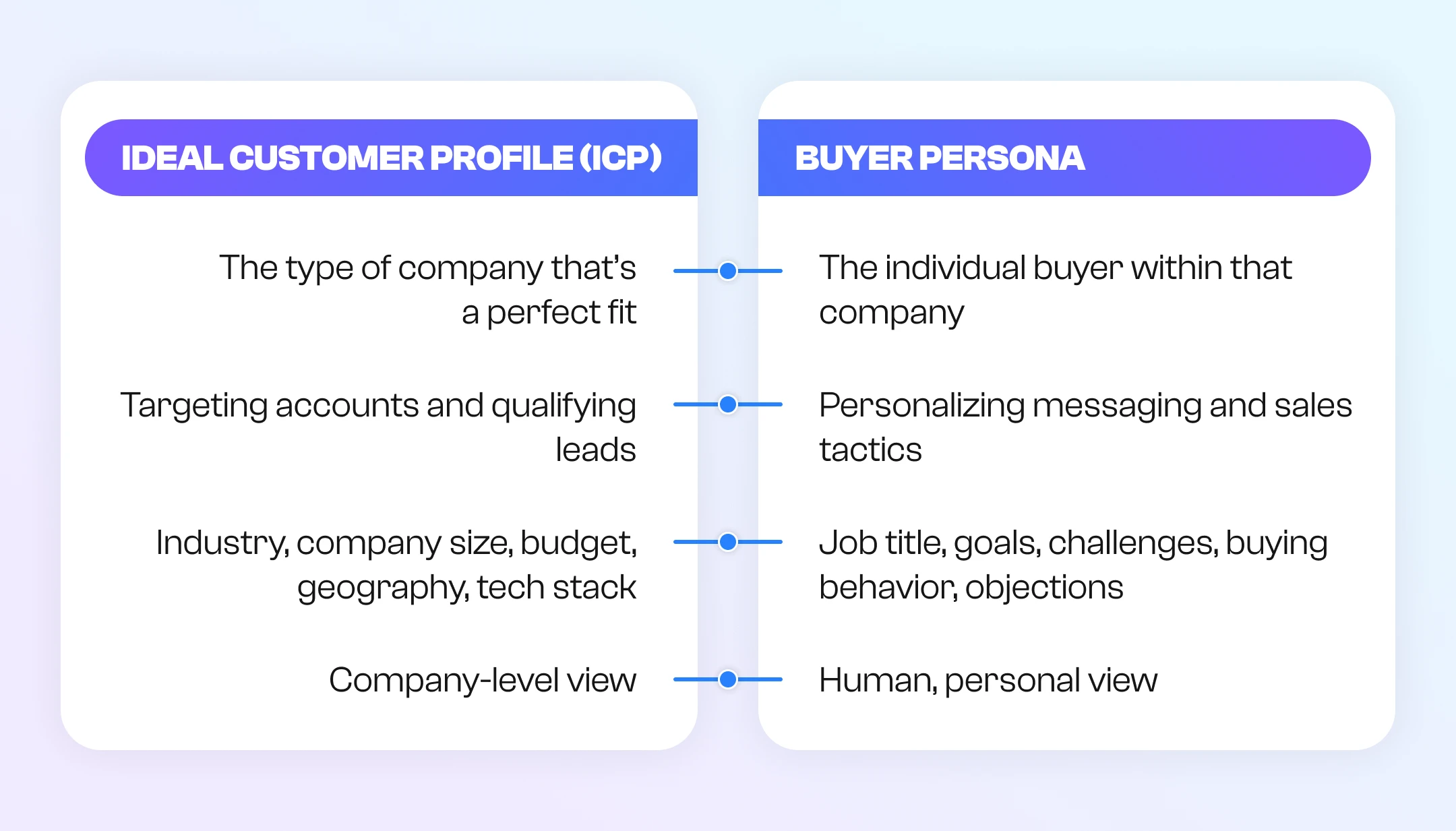
You’ve probably heard both terms: “Ideal Customer Profile” and “Buyer Persona”. And yes, they’re often confused—but understanding buyer persona vs ICP is key to building an effective targeting strategy.
Let’s break down the difference between a buyer persona vs ideal customer profile and see how each plays a unique role in shaping your outreach and messaging.
Ideal Customer Profile (ICP)
An ICP (Ideal Customer Profile) is all about identifying the company or type of customer who best fits your offer. Pairing your ICP with buyer persona insights turns general targeting into precise engagement.
We’re talking about company size, industry, budget, location, and tech stack—basically, the stuff that tells you whether this business is worth going after. If you’re in B2B, this might be a SaaS startup with 50–200 employees and a growing sales team. The goal? To focus your efforts on the right kinds of prospects from the start.
Buyer Persona
Buyer personas zoom in a little closer, while ICP vs buyer persona highlights the difference between company-level targeting and personal-level engagement.
These are fictional but research-based profiles of the people within those ideal companies—decision-makers, influencers, and end-users. This is where the ideal customer profile vs buyer persona distinction matters: one identifies the account, the other personalizes the pitch.
Think: “Emily, Head of Marketing at a mid-size eCommerce brand, who’s frustrated with slow campaign approvals and wants better analytics.” Personas give you insights into personal goals, objections, habits, and triggers so you can craft messaging that hits home.
Still confused by the buyer persona vs ICP debate? Think of it this way: your ICP is the map, and your buyer persona is the compass that helps you navigate conversations inside that territory.
ICP = Which companies do you want as customers?
Buyer Persona = Who are you speaking to inside those companies?
Your ICP tells you where to aim. Your buyer personas help you hit the bullseye. That’s why marketers often compare target audience vs ICP vs buyer persona—each layer adds depth to your strategy, from broad targeting to personalized messaging.It’s not a question of ICP vs buyer persona, but how the two can complement each other to help your team connect with the right companies and people inside them.
Successful lead generation often depends on understanding the difference between buyer persona vs ideal customer profile—without that clarity, your targeting will always feel a little off.
Book a quick call to explore tailored pricing options based on your goals, industry, and budget — and see how high-quality B2B leads can drive real results.
How to Create an Ideal Customer Profile: Detailed Guide
If you’re in B2B, it’s essential to define the ideal customer profile clearly—it’s the foundation of your marketing and sales strategy.
Here’s how to define your ideal customer profile step by step—without overcomplicating the process.
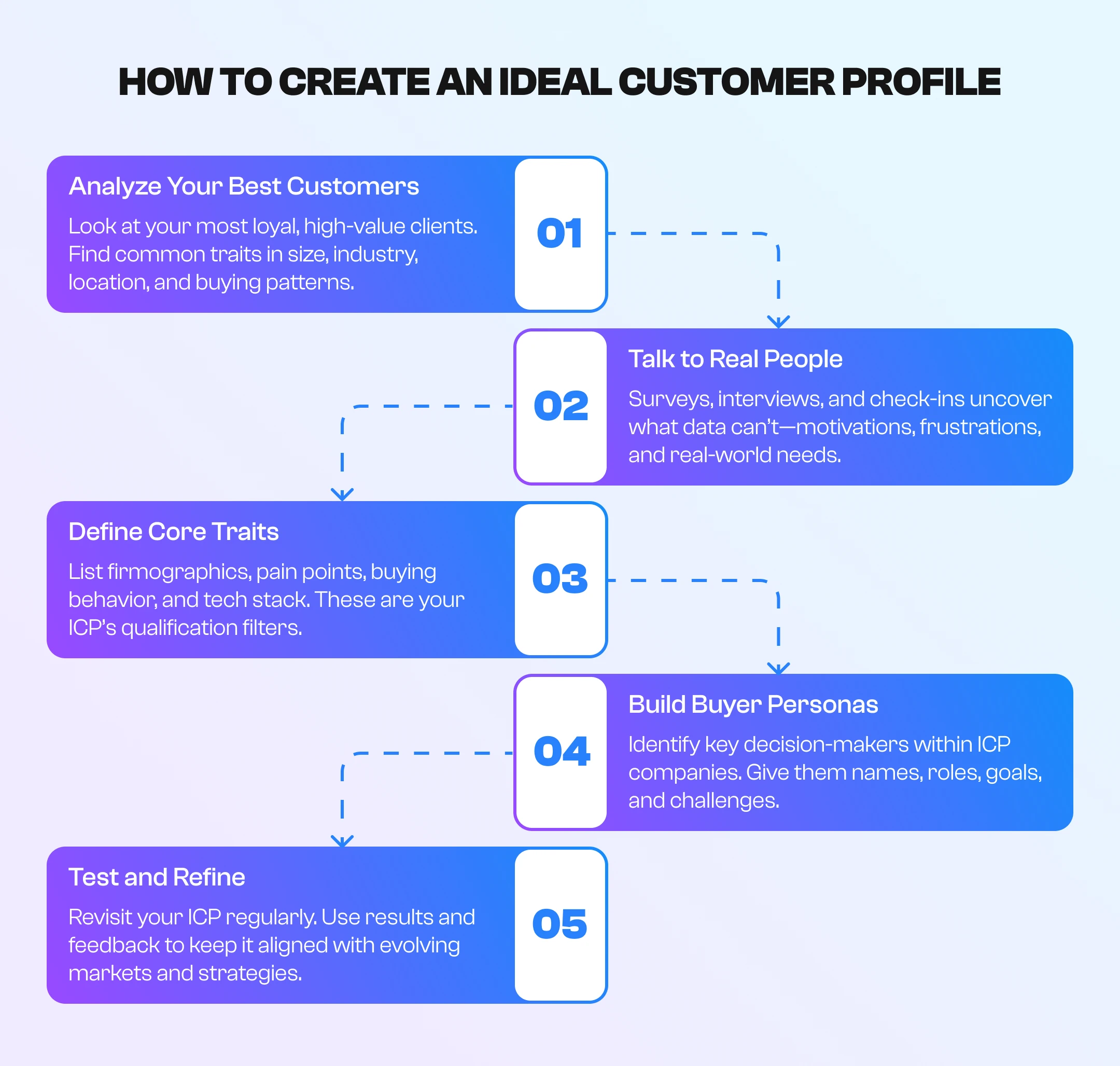
1. Start with Your Best Customers
One of the easiest ways to define your ICP is to analyze your current client list. Who’s been with you the longest?
Who’s generating the most revenue with the least amount of friction? These are your gold mines—and the foundation for defining your ICP based on real-world performance.
Find common patterns—industry, company size, location, team structure, buying cycle, even the tools they use. That’s your starting point.
2. Go Beyond the Numbers
Raw data is great, but talking to real people will take you further. Run a few interviews, send out surveys, or even have casual check-in calls. A common mistake is skipping over the importance of customer profiles definition, but these profiles are what ground your sales and marketing in reality.
Ask what they love, what frustrates them, and what made them choose you over a competitor. You’ll be surprised how much insight comes from just listening.
3. Identify Core Traits
Now pull it all together. This is where you begin defining ideal customer profile criteria—those core traits that make someone a great fit. That includes:
- Firmographics: Company size, revenue, industry, location
- Pain points: What problems are they trying to solve?
- Buying behavior: Budget, buying cycle, who’s involved in the decision
- Tech stack: What tools they already use (and how you integrate)
This is when you define ICP sales parameters, giving your sales team a clear direction for outreach and qualification.
4. Map Buyer Personas
Once you’ve gone through how to define an ICP, the next step is mapping out the individuals within those companies who drive purchasing decisions.
Who’s calling the shots? Who influences the deal? Create a few fictional profiles with names, roles, goals, and challenges. It helps bring your strategy to life—and makes your messaging way more personal.
5. Test, Learn, Refine
Defining your ICP is never a one-and-done exercise—it evolves alongside your business, customer base, and product.
As your business evolves, your ideal customer might shift, too. Keep checking in on performance—do your best leads still match your ICP? Are conversion rates improving? Stay flexible and keep refining based on what’s working (and what’s not).
Still wondering how to define your ICP effectively? It starts by identifying who delivers long-term value and aligning your strategy around them.
Why Is an Ideal Customer Profile Important?
Let’s be honest—trying to sell to everyone is a fast way to waste time and money. That’s where a solid ICP sales strategy comes in. Everything else becomes easier when you know exactly who you’re trying to reach. Here’s why it makes such a big difference:
1. Your Sales Team Works Smarter, Not Harder
So, what is an ICP in sales? It’s a tool that helps reps recognize perfect-fit customers so they focus on leads that are more likely to convert. That means more meaningful conversations, faster sales cycles, and better conversion rates. They can craft pitches that speak to the customer’s real needs, not just toss out generic one-liners.
2. Higher-Quality Leads, Less Guesswork
A strong ICP sales model helps you identify the right prospects early, improving lead quality and conversion efficiency. Whether running ads, building outbound lists, or setting up content funnels, your lead gen becomes sharper and more focused. You’ll stop wasting budget on people who were never going to buy in the first place.
3. Messaging That Hits the Mark
The more you know about your ideal customer, the easier it is to write emails, ads, and landing pages that connect. You’re not guessing what they care about—you already know. So your messaging gets more personal, relevant, and likely to convert.
4. Customers Stick Around Longer
A focused ICP sales approach ensures you’re targeting the right people from the start, so they stick around and see long-term value. That means higher retention, more upsells, and a more substantial base of loyal customers who like working with you.
5. You’ll Stop Wasting Time and Budget
When you know who not to target, you stop burning through resources chasing the wrong crowd. Your time, money, and team efforts go where they matter most—that’s how you start scaling sustainably.
How Your ICP Marketing Strategy Shapes the Entire Funnel
If your marketing isn’t built around your ideal customer profile, you’re guessing. A clear ICP helps you focus on the people who are most likely to care about what you offer—and buy it.
Here’s how it comes into play across your marketing process:
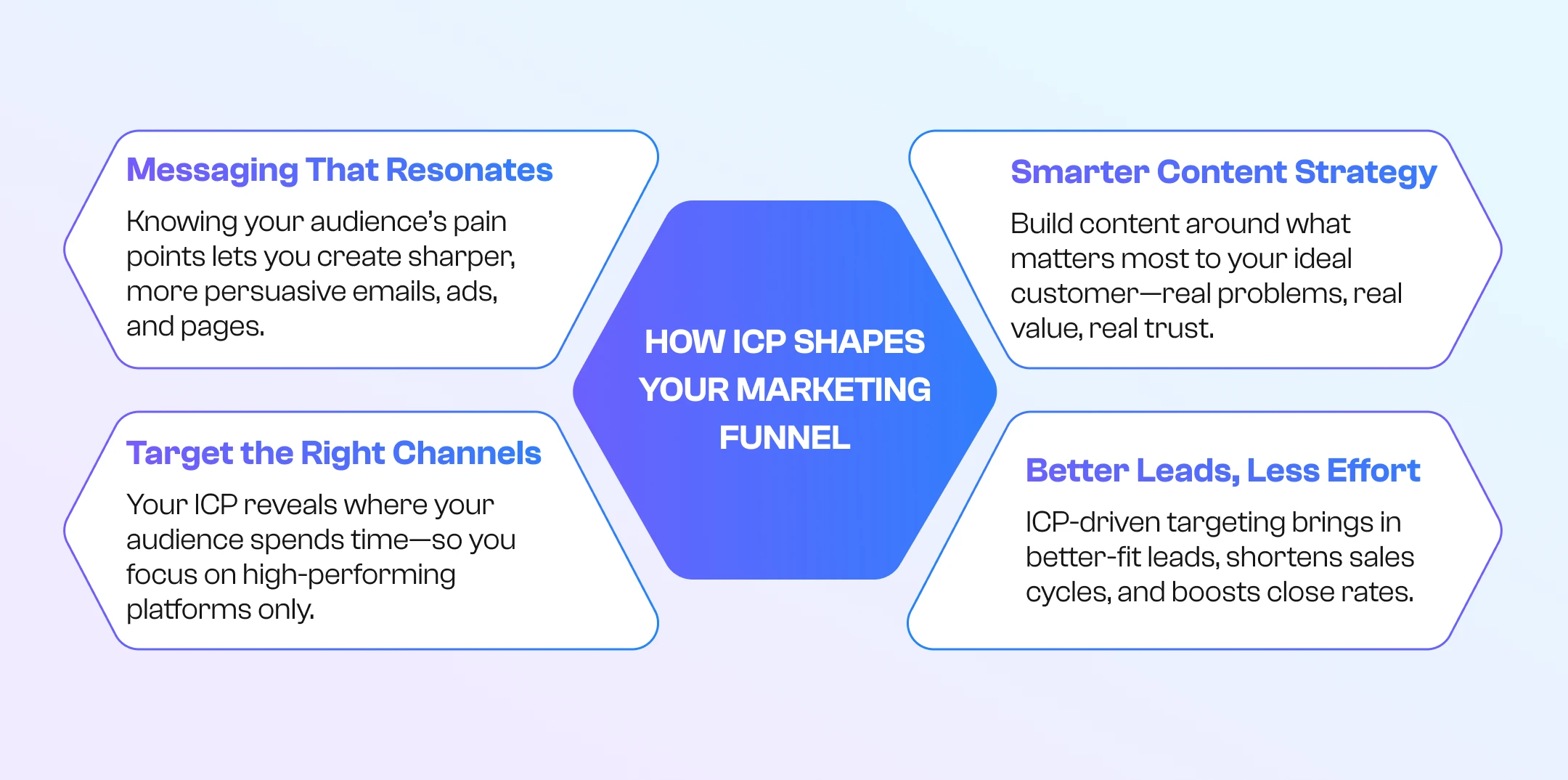
Messaging That Speaks Their Language
When you know your audience inside out—their pain points, goals, and what keeps them up at night—you can write emails, ads, and landing pages that hit home—no more vague or generic content. Your messaging becomes sharp, specific, and way more persuasive.
Picking the Right Channels
Your ICP tells you where your audience spends time. Are they on LinkedIn? Reading niche industry blogs? Attending webinars? Instead of spreading yourself thin across every platform, you can double down on the ones that get results.
Smarter Content Creation
Once you understand what your ideal customers care about, content ideas get much easier. Whether it’s blog posts, guides, or case studies, you’ll create stuff that solves real problems and builds trust. That’s how you become the go-to brand in your space.
Better Leads, Less Effort
A strong ICP helps you attract the right leads from the start. You’re not just generating more leads—you’re developing better ones. These people are a good fit, meaning shorter sales cycles, higher close rates, and more satisfied customers.
Your Sales Process and ICP
Want to close more deals without burning out your sales team? Align your sales process with your ideal customer profile. When you know who you’re selling to—and what matters to them—you can tailor your approach to hit the mark every time.
Here’s how your ICP makes sales smoother and more effective:
Qualify Faster, Sell Smarter
The ICP meaning sales teams rely on comes down to one thing: a clear checklist that helps them qualify leads fast and avoid wasting time. Focus on the ones that have a reason to buy. This keeps your pipeline clean and your team focused on deals that are more likely to close.
Tailor Your Pitch
No more one-size-fits-all sales scripts. With an ICP, you can personalize your pitch to match what your prospect cares about most—cutting costs, saving time, or hitting growth targets. Relevance wins deals.
Handle Objections Before They Happen
If you know your ideal customer’s everyday worries, you can tackle them head-on before they become roadblocks. That kind of confidence builds trust quickly and shows prospects that you understand.
Boost Upsells and Cross-sells
Your ICP is valid before and after the sale. When you know your customers’ needs, you can recommend the right add-ons or upgrades at the right time. That means more revenue per customer and a better experience on their end.
Who Is Your Ideal Customer?
Before you can market or sell anything effectively, you’ve got to know who you’re doing it for. Your ideal customer is the person or business that benefits most from what you offer and returns the most value. They’re easier to work with, more likely to stay loyal, and more likely to convert.
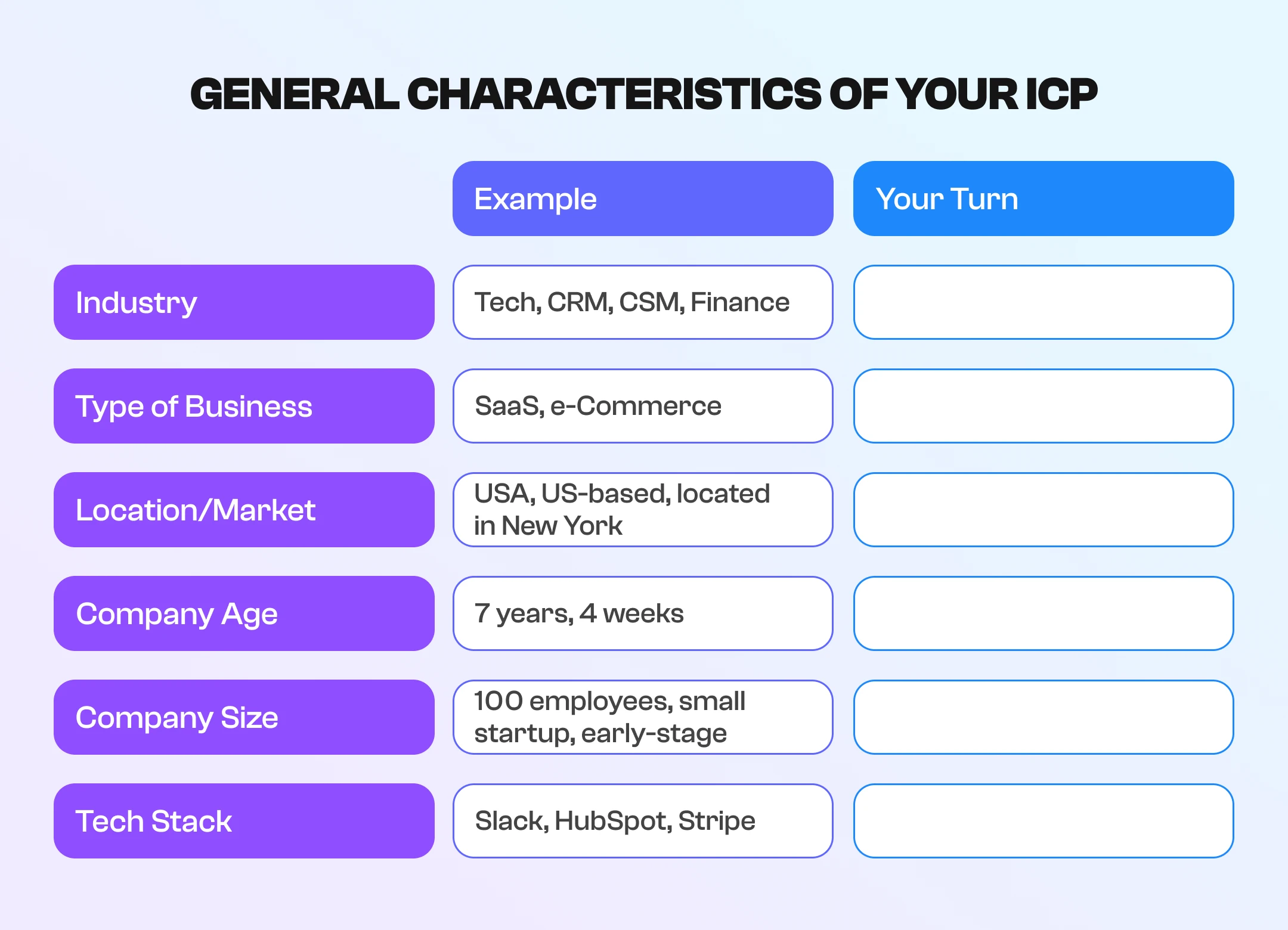
To succeed, you need to understand the ICP business meaning in your niche—who your solution truly serves and why.
So, how do you spot them? Start by looking at four key areas:
Demographics (if you’re targeting individuals)
These are the basics:
- Age range
- Gender
- Location
- Income level
- Job or role
This info helps shape your tone, messaging, and even where your content should show up.
Firmographics (for B2B companies)
If you’re selling to other businesses, look at:
- Industry
- Company size
- Location
- Revenue
This clarifies which businesses are the best fit—and lets you zero in on prospects worth your time. The meaning of ICP evolves slightly by context, but the core remains the same: finding your best-fit audience and serving them well.
Psychographics (what they care about)
Here’s where it gets deeper. Ask yourself:
- What are their interests and values?
- What motivates them to act?
- What kind of lifestyle do they have?
- What are their most significant pain points?
This is how you connect beyond features and pricing. It’s what makes your messaging stick.
Buying Behavior (how they make decisions)
And finally:
- How often do they buy?
- What’s their average spend?
- Who makes the buying decision?
- Do they prefer talking to sales, reading reviews, or trying demos first?
Knowing the ICP marketing meaning is key to spending your budget wisely, optimizing campaigns, and scaling predictable growth. Understanding how your ideal customers buy helps you meet them with the right approach, at the right moment.
Not all B2B lead generation is created equal. Let’s talk about a strategy that actually delivers qualified leads — not empty promises.
ICP Template to Get You Started
Looking for a solid ICP template to get you started? Here’s a practical B2B customer profile template you can customize to align with your business goals. There’s no universal formula, but this B2B ICP template gives you a flexible foundation to adapt and scale.
This ICP ideal customer profile template breaks down essential categories you’ll want to define:
Use this ideal customer profile template as your starting point. Adjust and expand it based on your company’s specific market, product, and goals. The more detailed your template ICP becomes, the easier it is to identify, engage, and convert your ideal B2B prospects into long-term customers.
Many growing teams benefit from downloadable ICP templates that structure the process and reduce guesswork. Whether building from scratch or revising an old version, an ideal customer profile template B2B marketers trust will streamline targeting and boost ROI.
What Does ICP Mean Across Different Industries?
An ICP meaning in business, marketing, sales, and product development can shift depending on who’s using it.
So, what is ICP in business? The framework defines which type of customer or company fits your product or service best. But how that “ideal” is defined depends on what you’re selling and to whom.
Let’s break it down by context:
ICP Meaning in Business and Sales
The ICP meaning in business highlights customers who bring the most lifetime value and align well with your solution. The ICP meaning in sales is efficiency—it helps qualify leads faster and focuses outreach on high-value prospects. Instead of chasing every lead, sales teams can prioritize prospects that match the ICP, saving time and boosting close rates.
The ICP meaning in corporate environments highlights high-value customers who align with your strategic goals and revenue targets.
ICP in Marketing
ICP in marketing means knowing who you’re trying to attract. The ICP meaning in marketing is to help marketers refine targeting, craft personalized campaigns, and optimize messaging for high-conversion results.
The more aligned your marketing strategy is with your ICP, the more cost-effective your efforts become.
ICP for Startups and Tech Companies
In the startup and tech world, ICP meaning in startup and ICP meaning tech circles that often includes traits like funding stage, agility, and rapid scaling potential.
For example, a SaaS startup might define ICP as product managers at Series A–C companies using tools like Slack and Jira. This laser focus helps lean teams grow faster by targeting only high-potential leads.
ICP in SaaS and Software
The ICP meaning SaaS companies rely on typically involves identifying long-term users with recurring needs, budgets, and alignment with product value.
The ICP product meaning often includes lifecycle readiness, use cases, and clear alignment with the problem your solution is designed to solve. The ICP sales meaning goes beyond surface-level qualification—it’s about crafting pitches based on ROI, efficiency, and long-term fit.
ICP in IT and Technology
The ICP could include system requirements, integration needs, or security standards in the IT or broader technology sectors. The ICP meaning in IT often includes technical requirements, security standards, and procurement workflows critical for software evaluation.
In ICP software meaning and ICP meaning technology contexts, “ideal” also includes system compatibility and scalability over time.
Whether in B2B marketing, SaaS sales, or corporate strategy, your ICP defines who you’re trying to reach and why. The ICP meaning software providers prioritize compatibility, onboarding ease, and value delivery across long-term use. It’s the foundation for targeted growth, and knowing precisely what ICP means in your specific industry helps you put it to work more effectively.
Understanding the definition of ICP, whether you’re in tech, SaaS, sales, or marketing, ensures every outreach, pitch, and product feature lands where it matters most.
Questions to Help You Define Your Ideal Customer
If you want to build a solid Ideal Customer Profile, you’ve got to ask the right questions. The goal is to dig into what makes your best customers tick—so you can find more people like them. From ICP data meaning in analytics to ICP company meaning in strategic targeting, clarity around your ideal customer drives smarter growth.
The ICP meaning customer teams care about, involves aligning your solution with the customer’s goals, pain points, and lifecycle stage.
Here are some questions to get you started:
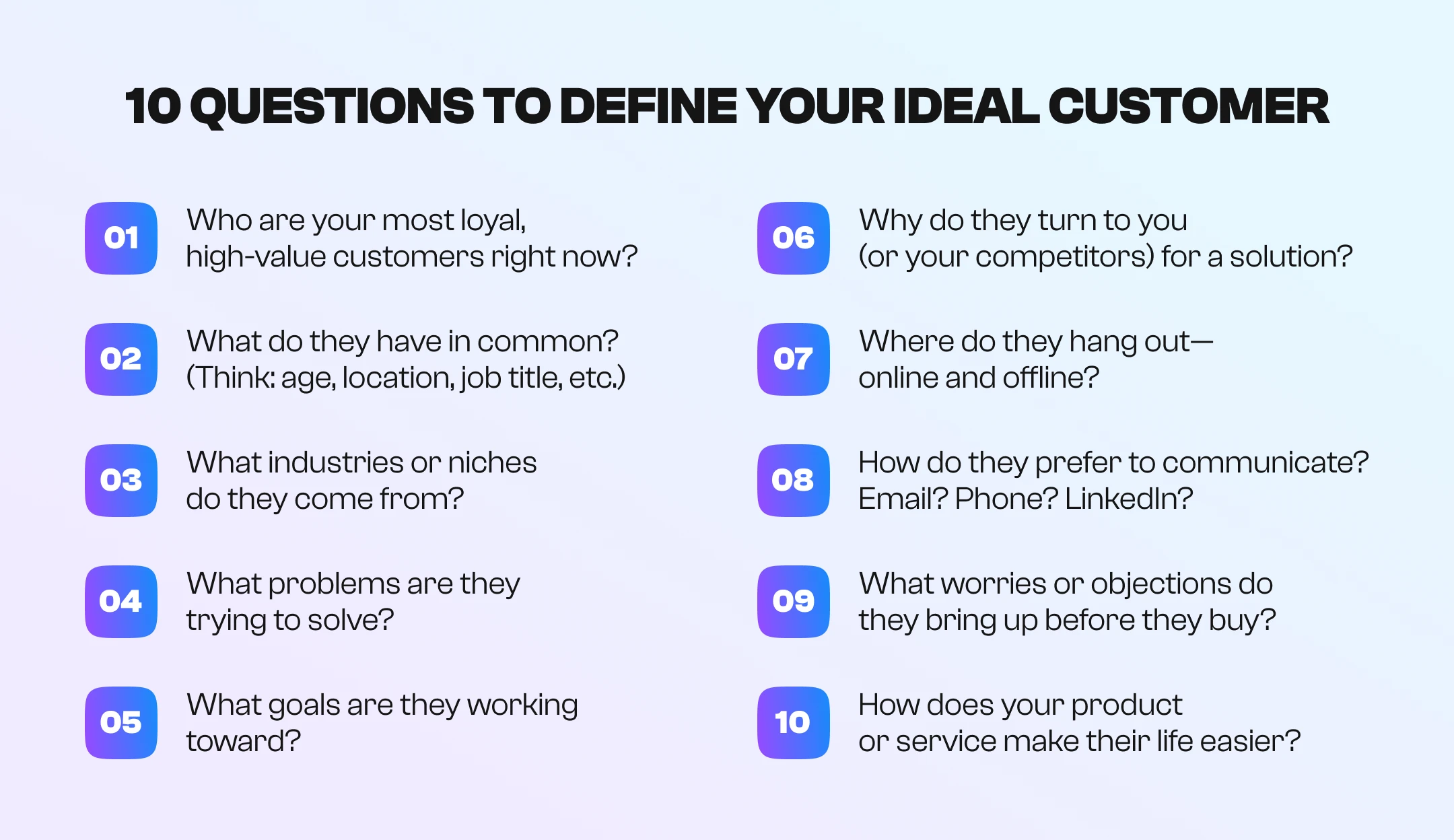
You don’t need to answer every single one of these right away. But the more you can answer even a few, the more accurate and helpful your ICP will be.
This is how you stop guessing and start targeting with purpose.
Ideal Customer Profile Example Breakdown by Industry
Still unsure how your ICP should look? Let’s walk through an example of ICP to see how it applies in the real world.
Look at several ICP examples across industries to understand how customer needs and business goals influence your ideal profile.
Whether you’re B2B or B2C, the structure stays the same—the details change, as these ideal customer profile examples will demonstrate.
ICP Example 1: B2B Software Company
- Who they are: IT managers and decision-makers at mid-sized tech companies
- Company details: Tech firms with 50–200 employees, often scaling fast
- Mindset: Love trying new tools, value automation, early adopters
- Buying habits: Do their research online, prefer demos before committing
ICP Example 2: Fashion E-commerce Brand
- Who they are: Women aged 25–35 with an interest in unique, stylish pieces
- Customer type: Trend-focused shoppers, often from urban areas
- Mindset: Care about sustainability, follow influencers, want to stand out
- Buying habits: Shop online regularly, engage with brands on Instagram and TikTok
ICP Example 3: Local Fitness Studio
- Who they are: Adults aged 30–50 who live nearby and value wellness
- Customer type: Busy professionals in city centers
- Mindset: Focused on health, enjoys group workouts, wants results
- Buying habits: Loyal to routine, book online, motivated by progress tracking
These ICP examples are just starting points, but they show how powerful and flexible your targeting becomes when your B2B Ideal Customer Profile is clearly defined. The more details you can define, the easier it becomes to attract the right customers and speak directly to them about what matters.
If you’re in retail or e-commerce, analyzing shopper profile examples can also inform your ICP by highlighting demographic traits, motivations, and buying behaviors.
Conclusion
Creating a B2B Ideal Customer Profile isn’t just a marketing exercise—it’s a game-changer for how you run your business. Everything becomes more focused when you truly understand who you’re selling to. Your messaging gets sharper, your lead quality improves, your sales team stops wasting time, and your product or service delivers real value to the right people.
Building a strong ICP sales framework will pay off across every part of your funnel, whether you’re just starting or fine-tuning your strategy. Keep it updated and relevant, and don’t be afraid to revisit it as your business grows.
The more clearly you define your ideal customer, the easier it becomes to find, connect with, and convert them. That’s how you scale with purpose.
FAQ
What is the ICP meaning business?
ICP stands for Ideal Customer Profile. The ICP sales concept describes the ideal customer who would benefit most from your solution and return the highest value.
What’s the difference between an ICP and a buyer persona?
An ICP focuses on the type of company or ideal customer segment you want to target (e.g., industry, company size, revenue). A buyer persona zooms in on the individual decision-makers within those companies—their motivations, behaviors, and personal goals. You need both to market and sell effectively.
Why is an Ideal Customer Profile important?
A strong ICP definition in sales includes understanding the traits that make a lead valuable. This helps you qualify faster, close more, and waste less time. It also improves ROI across sales and marketing by focusing your efforts where they matter most.
How do you create an ICP?
Start by analyzing your best existing customers. Look at patterns in industry, size, behavior, and needs—layer in customer feedback and market research. From there, build a profile that includes firmographics, pain points, and buying habits. Keep refining it over time.
What is ICP in marketing?
In marketing, your ICP is the foundation of your targeting strategy. It tells you who to speak to, where to find them, and how to shape your messaging so it resonates.
What is an ICP in sales?
The ICP meaning in sales is about efficiency—it guides lead qualification, outreach, and product demos so you can close more deals faster.
What’s an example of a B2B ideal customer profile (ICP)?
A sample B2B ICP might look like this: “Mid-sized SaaS companies (50–200 employees) based in North America, using HubSpot or Salesforce, with a marketing team of at least five people, looking to scale demand gen.”
How is ICP used in SaaS companies?
SaaS companies often use ICPs to define high-LTV customers needing recurring software access. This helps reduce churn and improve acquisition efficiency.
Can a startup have an ICP?
Startups benefit the most from having a clear ICP early on. It helps them avoid spreading resources too thin and focus on a niche they can win.
Is there a difference between ICP’s meaning in IT and marketing?
Yes. An ICP might focus more on IT system requirements, security standards, or tech stack compatibility. Marketing is more about pain points, interests, and buying behaviors.
No cold outreach, no stress. Just sales-ready calls with decision-makers.


